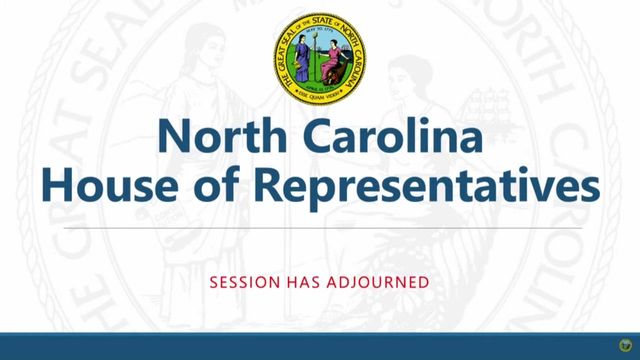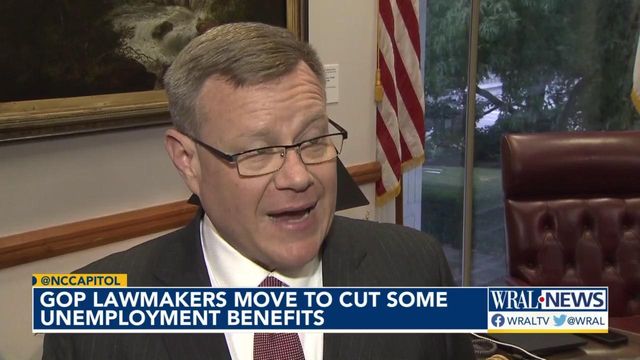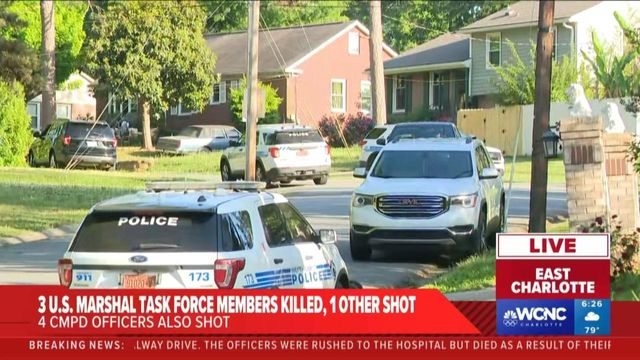House GOP leaders move to cut off federal jobless aid
North Carolina House leaders are backing a bill to cut off the $300 federal jobless checks some believe are causing a labor shortage in North Carolina.
It's not clear yet how many of the roughly 240,000 people on NC's unemployment rolls would lose that support. At a hastily called meeting of the House Finance committee late Wednesday, bill sponsor Rep. Jason Saine couldn't say.
The checks are currently scheduled to end September 6, but this bill would cut them off early – 30 days after it becomes law.
Twenty-four other states have opted out of the extended Federal Pandemic Unemployment Compensation program early, including South Carolina and Georgia.
Saine, R-Lincoln, said the checks are contributing to a "harnessed economy" and a slower post-pandemic recovery. He said the bill is an attempt "to get us back to a somewhat normal economy, a normal way of doing business, a normal way of existing."
"We're trying to get back to there as fast as possible," he said.
The House proposal has been put into Senate Bill 116, in a maneuver known as a "gut-and-amend" to get around parliamentary rules and move the bill more quickly. The House also pasted a couple of tax measures, which the Senate has already rejected in a separate measure, into the bill.
The Senate also has its own plan on the $300 supplements, though it would also take an act of Congress to implement.
Rep. Wesley Harris, D-Mecklenburg, said there's no conclusive evidence that the benefits are keeping workers off the job market. For some, he said, the federal check is what's allowing them to simply survive after having run out of state benefits.
"This entire debate is going to be over on September 6th," Harris told the panel. "And just to add some undue burden on the people who actually are struggling to make a political point, and kind just say that we're getting people back to work when there's no conclusive evidence that this is the case, I honestly just think this is this is a cruel thing to do."
"As we look to our competitors," Saine responded, "from state to state and what's happening around us, these other states are getting back to work very quickly. We are falling way behind."
"I think we may have a different philosophy here," Saine added, "but I do believe that everyone in this room believes that we should get our economy back on track and get back to work."
Governor Roy Cooper has shown no signs of withdrawing from the federal program. In a statement late today, spokesman Ford Porter didn't directly say the governor would oppose this bill, but he said the federal subsidies should continue to be spent in North Carolina to help boost the state's economy.
"Governor Cooper wants to get North Carolinians working and his executive order has reinstituted work search requirements for those receiving unemployment benefits," Porter said in a statement. "He wants to help small businesses and particularly the hospitality industry strengthen their workforce with direct financial help within the bounds of the law and badly needed childcare for their employees."
The measure, which emerged Wednesday evening, also tacks in the House position on a pair of tax breaks: One to lower taxes on businesses that took PPP loans and another to forgive state income taxes on the first $10,200 in unemployment benefits people received last year.
A bill with both those breaks passed the House nearly unanimously earlier this year, but was rejected by the state Senate, which has its own plan for grants to help businesses that took PPP loans and other stimulus funding.
That Senate plan, which doesn't include the tax break for people on unemployment, is part of a broader tax bill cutting both the state's personal income tax rate and the corporate income tax rate.
The House bill is on a fast track: It was added Wednesday evening to the floor calendar for Thursday's House session. It needs two votes there to move to the Senate for more debate.











